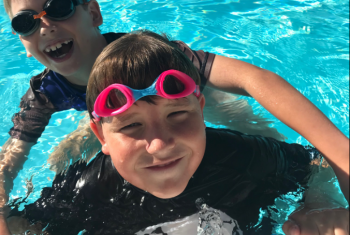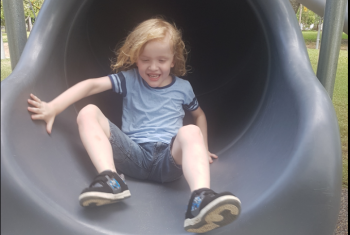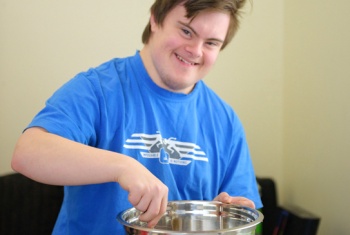When Shelly Lynde arrived at son Alex’s school a few weeks ago to be told by his support worker that a little boy in his class had asked to play with him, she shed tears of happiness.
By the end of lunchtime, a little girl had joined the two boys and the seeds of friendship were firmly sown.
“Socialisation is a bit of a challenge for Alex,” Shelly said.
“But I’ve always found that the other children at kindy and at school are beautiful towards him. The kids don’t judge, they just think ‘that’s just Alex and he has a support worker but who cares’”.
Little Alex has endured more than any child should have to bear in his five short years – open heart surgery at one year of age, social and physiological challenges due to his autism, and a diagnosis at six months of age with neurofibromatosis (NF), a degenerative condition which causes benign tumours called neurofibromas to grow around his nerve cells.
Shelly said diagnosis of NF was often challenging, and she considered the family to be fortunate that Alex’s diagnosis was made so early on in his life.
While in utero, Alex was found to have a heart abnormality known as a right aortic arch, but his parents were assured that it was simply a variation of normal.
At just six months old, Alex started developing the brown markings known as ‘café au lait spots’ which are characteristic of NF and that, in addition to some other soft markers including macrocephaly (enlarged head) and pectus carinatum (‘pigeon chest’), led to his NF diagnosis.
“It seemed like almost overnight Alex started developing the café au lait spots. It started with one quite large one on top of his thigh, then overnight they were popping up everywhere,” Shelly said.
Because NF is usually a genetic condition, Shelly and her husband Michael went through family genetic testing and it was found that Alex’s condition was simply an unexplained fluke of nature with no genetic involvement.
With one hurdle seemingly overcome, Shelly and Michael took Alex and their older son Jonathan to Shelly’s home country of Canada for her family to meet Alex for the first time.
Within a week of returning, Alex developed a serious respiratory infection which led to several ambulance rides to the hospital, and it was there that they first found out his heart condition was more serious than first thought.
“We saw a paediatrician at the hospital who immediately asked ‘what’s that crazy noise he’s making’ in reference to the whistling sound he made when he breathed, and they told us that he actually had a much more complicated heart abnormality than initially diagnosed.”
Two days later, on 18 September, Alex’s little body just gave out.
He was intubated in emergency, and a surgeon told Shelly and her husband Michael that Alex had a double aortic arch which required urgent repair.
The sound that he made while he breathed was a vascular ring restricting his breathing – little Alex was literally struggling through every breath.
At the age of just 12 months, Alex had open heart surgery and it was while he was in hospital recovering that doctors noticed he hadn’t met any of his developmental milestones.
With 50% of children with NF having either attention or learning difficulties, Alex’s diagnosis of global developmental delay was no surprise to Shelly and Michael.
Group therapy was a disaster because Alex couldn’t focus or sit still.
The only option left for the family was private therapy, which meant that Shelly was forced to go back to work to absorb the enormous cost, despite the challenges that this created with a child who regularly had to kept home or picked up early from kindergarten due to frequent respiratory illnesses and to be taken to therapy appointments.
“He needed that one-on-one attention, but weekly speech therapy, occupational therapy and physiotherapy was like having a second mortgage,” Shelly said.
Relief came in March in the form of the National Disability Insurance Scheme, which now funds weekly speech therapy, occupational therapy and a continence nurse to help Alex with toileting at home and at school with the goal being to keep him in a mainstream classroom.
“Before the NDIS, I found it frustrating that all the literature says early intervention is key to allow children with NF to integrate into mainstream society. But if I can’t pay for it, how am I supposed to do it? It was a frustrating battle,” Shelly said.
“NDIS has alleviated the financial pressures. To go from receiving nothing to Alex having all of his therapy costs paid for, it means so much to our family. I feel like doing cartwheels!”
“There were times before we had the funding that things were difficult and we just had to make it work. Now we have the NDIS funding and Alex’s school (St Josephs Primary in Hawthorn) was able to apply for funding for a support worker to assist him.”
“The NDIS has also helped him at school as some of his therapists see him during the school day so they’re working with his teachers and with me at home so there is full integration of supports.”
Shelly said although it was early days, the fact that all of Alex’s supports were working together had lifted the burden of managing everything off her.
“There have been times I’ve been absolutely burnt out. Now I feel as if the weight has truly lifted off of my shoulders. It’s all come together.”
“Everybody has worked really hard collectively to give Alex the best possible outcome, and he has some great people who were big advocates for him. Without all this, he would not have been able to start school in February this year.”
Shelly said one of the best aspects of the NDIS support was that she now had the time to spend with Alex’s “biggest advocate”, 12 year old son Jonathan.
“Alex’s NF journey changed Jonathan’s life from the minute Alex was born,” Shelly said.
“I now have the time to devote to Jonathan which is especially important now that he has just started high school. There’s just so many things this has opened up for us.”
Shelly said that there were a lot of unknowns with NF and she had often wondered in the past about how Alex would fare as an adult.
“In some areas he’s so highly intelligent, but he’s not able to articulate himself, and I wondered how that would translate to when he’s an adult and wants to move out of home,” Shelly said.
"I'm not going to be around forever so I want to make sure he's looked after. He's a beautiful kid and I just want the best for him. If he needs that extra support to get him there, and NDIS can provide that, how fortunate are we."


